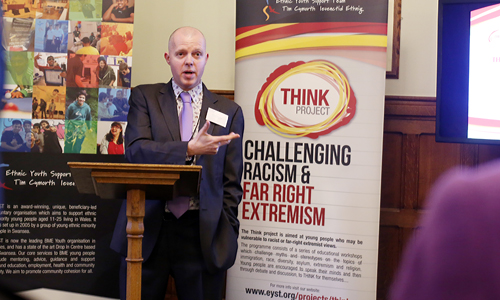Professor's scheme stems the rise of far-right beliefs

Fri, 21 Mar 2014 13:04:00 GMT
The Think Project, co-written by Huddersfield’s Professor Paul Thomas, is unveiled at the House of Commons
AN innovative scheme to stem the rise of far-right beliefs, such as racism among young people, by challenging their views during face-to-face encounters, has earned the approval of a University of Huddersfield expert on extremism. Professor Paul Thomas has co-written a report on the project and his findings were unveiled at a special House of Commons event.
Now there are plans for University of Huddersfield conference at which specialists from fields such as youth services and the police will be introduced to the scheme, launched in South Wales as The Think Project.
It is the brainchild of the Swansea-based organisation the Ethnic Youth Support Team (EYST). Financially backed by the Welsh Government and the National Lottery, it is a new approach to the prevention of far-right views among disaffected young white people. Its workers set out to hold what have been described as ‘dangerous conversations’ about race, immigration and extremism. The aim is to encourage the young people to think for themselves on these issues without swallowing extremist attitudes.
Professor Thomas’s research portfolio and his publications include an examination of the Government’s Prevent strategy – designed to combat extremism – and the policy known as Community Cohesion (As seen in the video). The latter was conceived by Professor Ted Cantle – who heads the Institute of Community Cohesion – and he invited Professor Thomas to collaborate on an appraisal of The Think Project.
Their report was launched at the House of Commons at an event entitled From Wales to Westminster – Challenging Far Right Extremism. On 17 June, a special seminar is to be held at the University of Huddersfield. Members of the EYST Team will describe their work and its results to an audience of specialists.
The Think Project
In their report on The Think Project, Professors Thomas and Cantle have no doubt that it is worthwhile. They write that: “The Think Project represents exactly the sort of preventative, educationally-based intervention with young people that we have long advocated in the face of rising levels of hatred and fear towards ‘other’ communities in our society.”
They also believe that the scheme could be the template for similar projects throughout the UK.
Professor Thomas said that he and Prof Cantle had interviewed many people in Swansea and the Welsh Government, who acted at strategic level, in order to provide guidance on how The Think Project could develop further.
“It is a brave and necessary move to target vulnerable white young people, because some of them are susceptible to extremist messages from far-right organisations and to strong racist beliefs that can lead to extremist action,” said Professor Thomas.
“There has been real tension about what can we do in terms of policy with those young people. Do we condemn them and try to make them behave themselves, or do we engage with them educationally and create space where they can talk these things through? That’s what this project is doing. They are having an open and honest educational debate.
“To have a long-lasting project like this that engages so directly with young people is unique and it offers very clear messages for a lot of policy agendas.”







